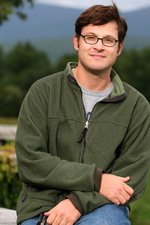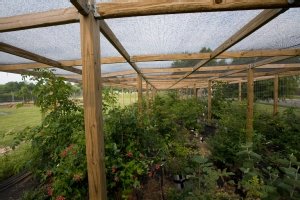Syracuse University biologist receives major award from the New York Academy of Sciences
Jason Fridley winner of a 2012 Blavatnik Award for Young Scientists

The New York Academy of Sciences has awarded Syracuse University biologist Jason Fridley a 2012 Blavatnik Award for Young Scientists. The prestigious award celebrates highly innovative, impactful, and interdisciplinary accomplishments of researchers under the age of 42 in the life sciences, physical sciences, mathematics, and engineering.
Fridley, an associate professor of biology in SU’s College of Arts and Sciences, is one of four faculty winners to receive the 2012 award. In addition to the faculty winners, 2012 awards will be presented to five postdoctoral researchers, and two faculty finalists during the Academy’s 9th annual Science and the City Gala on November 12 in New York City.
The winners and finalists were selected from more than 170 nominations from the New York tri-state area. In addition to SU, winners hail from Columbia University, Memorial Sloan-Kettering Cancer Center, New York University, Princeton University, The Rockefeller University, and Yale University. Faculty winners receive $25,000, postdoctoral researchers receive $15,000, and faculty finalists receive $10,000. The prizes are made possible by the generosity of the Blavatnik Family Foundation.
“We are very pleased and proud of the recognition Jason has received from the New York Academy of Sciences,” says George M. Langford, dean of SU’s College of Arts and Sciences. “One of the nation’s oldest scientific societies, the New York Academy of Sciences is committed to advancing scientific knowledge. The Blavatnik Awards further that mission by recognizing the outstanding quality of work being done by our young scientists."
Fridley’s research is focused on the ecology of plant communities, including their organization, their distribution with respect to the environment, and their control over ecosystem processes. His research comparing native and invasive plant productivity in deciduous forests in the Eastern United States was published April 25, 2012 in Nature, the premier international journal of science. Last fall, Fridley and his collaborator, Justin Wright from Duke University, received a $650,000 grant from the National Science Foundation to study the conversion of fallow fields to forested landscapes from New York State to Florida.
The massive study will look at how climate and soil conditions affect both the rate of succession and the types of trees and other vegetation that successfully repopulate the fields. The new study, which is just beginning, involves setting up test plots on SU’s South Campus; the Cary Institute for Ecosystems Study in Millbrook, N.Y.; the William L. Hutcheson Memorial Forest at Rutgers University, N.J.; Duke Forest at Duke University; HorseShoe Bend Ecology Experimental Research Site at the University of Georgia; and Tall Timbers Research Station and Land Conservancy in Tallahassee, Florida.

Fridley is also a collaborator with Phil Grime from the University of Shefffield, United Kingdom, on the Buxton Climate Change Experiment, one of the longest-running field studies for determining the effect of changes in temperature and precipitation on northern grasslands. Established in 1992, and funded in part by the NSF, the experiment currently focuses on factors that improve plant resiliency to climate change.
Fridley holds a Ph.D. from the University of North Carolina at Chapel Hill and a bachelor’s degree in biology from Bennington College, Vermont. In addition to his publication in Nature, Fridley has been a corresponding author or co-author on some 40 scientific papers in such highly regarded journals as the Journal of Ecology, the Proceedings of the National Academy of Sciences, and Ecology.
Fridley’s awards include the John L. Harper Prize for Best Paper by a Young Author from the British Ecological Society (2003), Keymer Prize for Best Student Talk from the British Ecological Society (2001), a NSF Graduate Research Fellowship (1998-2001), and a Henry H. Dearman Dissertation Fellowship from the University of North Carolina Graduate School (2001-02).
About the New York Academy of Sciences
The New York Academy of Sciences is an independent, not-for-profit organization that since 1817 has been committed to advancing science, technology, and society worldwide. With 25,000 members in 140 countries, the Academy is creating a global community of science for the benefit of humanity. The Academy's core mission is to advance scientific knowledge, positively impact the major global challenges of society with science-based solutions, and increase the number of scientifically informed individuals in society at large.
Media Contact
Judy Holmes
